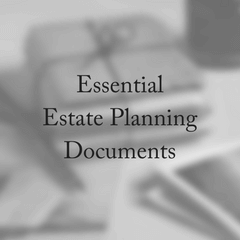
Estate planning is something we all put off, so to motivate you here are your essential estate planning documents. Estate planning revolves around an individual for whom the estate planning is for and some critical documents. It’s more than just a will. Essential estate planning requires the preparation and revision of more than a few key documents.
Unless you’re an estate planning lawyer, it’s unlikely that you’ll jump out of bed in the morning all excited about estate planning. For many people it is seen as being a highly unpleasant undertaking. But it is one that is necessary if you’d like a say in how your assets are managed not just upon you death, but also in the case of disability or if you are incapacitated in any way. And it’s not just about you. Essential estate planning is also about your loved ones, which by the time you die, could include children, grandchildren, and even great-grandchildren.
Estate planning is more than just a will. It is about building a framework to ensure that your wishes are met concerning your assets when you die. These assets will assist your chosen beneficiaries. They will assist your loved ones. Your legacy may help your son to start his own business or your granddaughter to go to university or ensure that your disabled child does not end up homeless. That’s why we call it essential estate planning.
Having the right documents in place will mean that your family has a better chance of remaining relationally intact because you have made clear in your advance health care directive what medical intervention you do or don’t want.
[Tweet “Estate planning is an essential part of your life.”]
 Having all of your documents in order is a part of essential estate planning. It’s not just having a checked list of what you consider to be your important documents ticked off for peace of mind but also having them easily accessible. You will make a difficult time much easier for your loved ones if they’re not having to trawl through mountains of unfiled or randomly stashed paperwork to find the deeds to your home or your life insurance policy information.
Having all of your documents in order is a part of essential estate planning. It’s not just having a checked list of what you consider to be your important documents ticked off for peace of mind but also having them easily accessible. You will make a difficult time much easier for your loved ones if they’re not having to trawl through mountains of unfiled or randomly stashed paperwork to find the deeds to your home or your life insurance policy information.
Another common scenario occurs where you have filed your essential estate planning documents with a lawyer, and nobody in your family knows who that lawyer is.
That’s why communication is so important. Have a discussion with your loved ones about what’s contained in the documents themselves, where you will keep them safely together and who their legal representative is. This means that not only can they find them without too much hassle but they will also have a basic understanding of their content. Surprises are usually unwelcomed by a grieving family unless they are of the good kind.
There are a number of essential estate planning documents that you need to consider. They are for everyone regardless of age, health and how big your asset pool is. Here is a list of essential estate planning documents to help you become more acquainted.
- A Will
A will functions to designate who will receive your assets when you die. It is a document that can and should be revised according to changing circumstances and assets. It is also the document in which you specify who will be guardian for your minor children. A guardian only takes legal responsibility once you are gone so there is no danger in naming them now in your will. You are free to change whom you choose as guardian but it needs to be formalised in your will for it to be clear and with less likelihood of being challenged. You should update your will every three to five years or when you have a major life change, such as a marriage, divorce, or birth of a child or grandchild.
- Testamentary Trust
This is a trust that is created by your will upon your death. It is designed to allow flexibility so that maximum benefits can be gained by tailoring the trust for your chosen beneficiaries. There are tax advantages (for your beneficiaries) to having a testamentary trust and it can offer protection for beneficiaries in the event of bankruptcy or divorce.. A testamentary trust is also a great tool for ensuring that your disabled child is cared for when you are gone.
- Power of Attorney
 This is a document which gives authority to another person (of your choosing) to make personal and/or financial decisions on your behalf. This is a document that is for when you are still alive but incapacitated by illness or an accident. It may be that you only need an attorney to act on your behalf for a short term if you are unwell for a short period of time. Often, though, it will be a long term responsibility for someone to act as your attorney after you are no longer able to make decisions for yourself either because of a serious brain injury or an illness such as dementia. It’s important to choose someone you trust, because the abuse of a power of attorney can be devastating for you and your family.
This is a document which gives authority to another person (of your choosing) to make personal and/or financial decisions on your behalf. This is a document that is for when you are still alive but incapacitated by illness or an accident. It may be that you only need an attorney to act on your behalf for a short term if you are unwell for a short period of time. Often, though, it will be a long term responsibility for someone to act as your attorney after you are no longer able to make decisions for yourself either because of a serious brain injury or an illness such as dementia. It’s important to choose someone you trust, because the abuse of a power of attorney can be devastating for you and your family.
- Advance Health Directive
This is the document that is also known as a living will. It is a formal way of outlining what you wish for your future health care. It only comes into effect if you lose the capacity to make decisions. Although you cannot account for every medical scenario in this document, you can outline generally what treatment you wish to or don’t wish to receive should you become unable to speak for yourself.
[Tweet “Always choose a power of attorney you trust completely.”]
- Letter of Wishes
Although a letter of wishes is not a legally binding document, it can be a very helpful one. It is a useful accompaniment to a will. It can be used to explain why you’ve made certain decisions with your estate planning. It might also be a place to outline your desires regarding burial or cremation. A letter of wishes may also be where you specify who you’d like to pass certain personal items on to that are not covered in your will.
At Estate Battles we are experienced in helping clients to complete their essential estate planning documents. We would love to help you. We offer a free, 10-minute phone consultation. Please contact us today!

